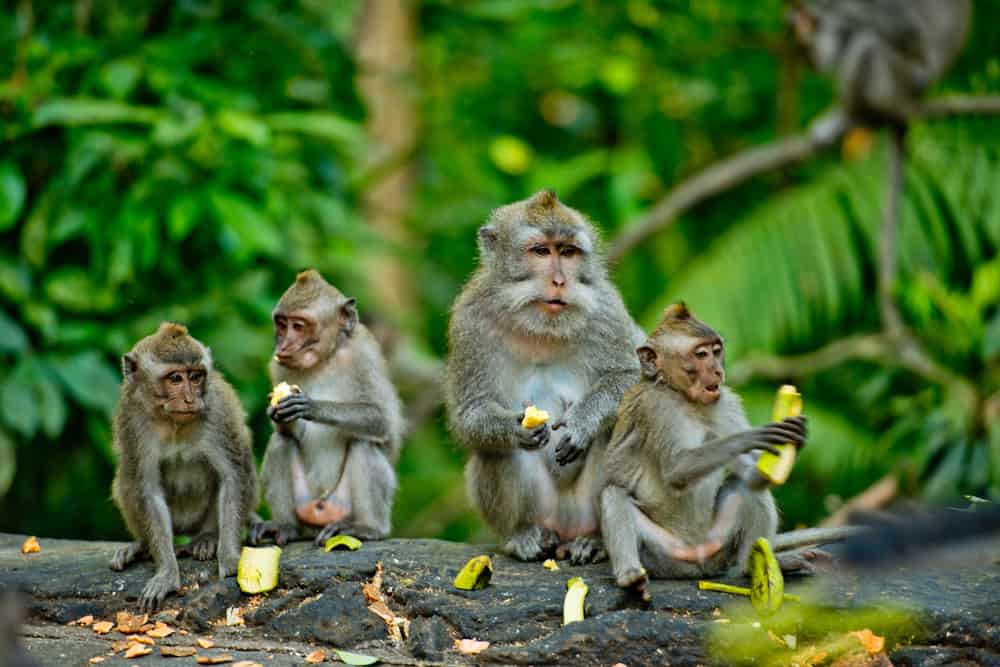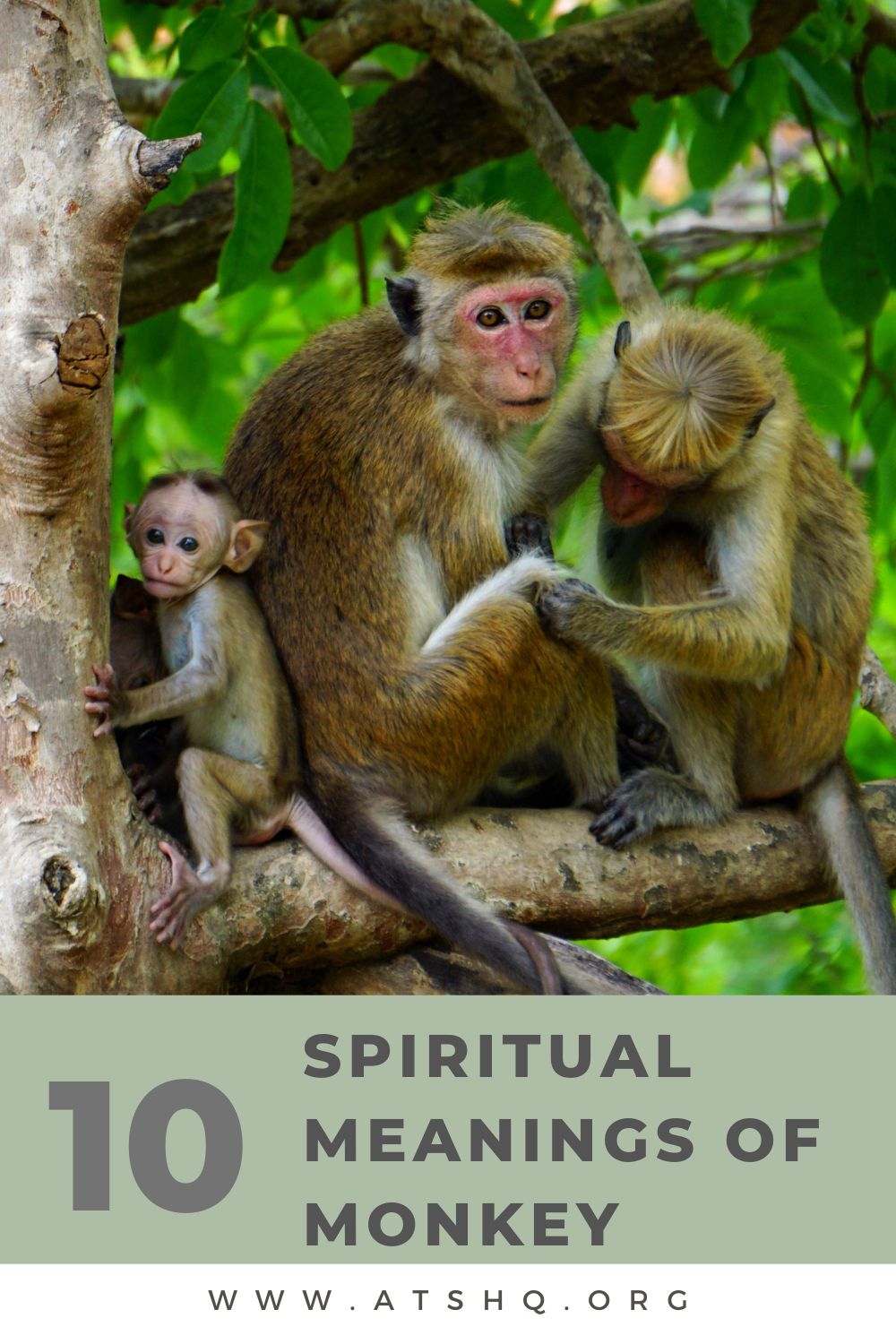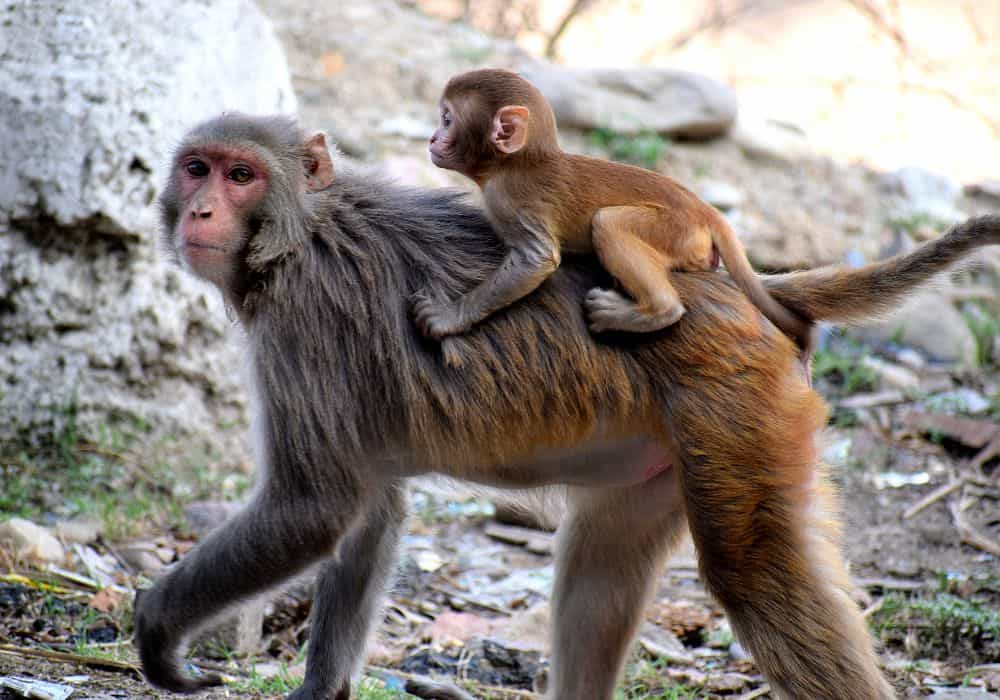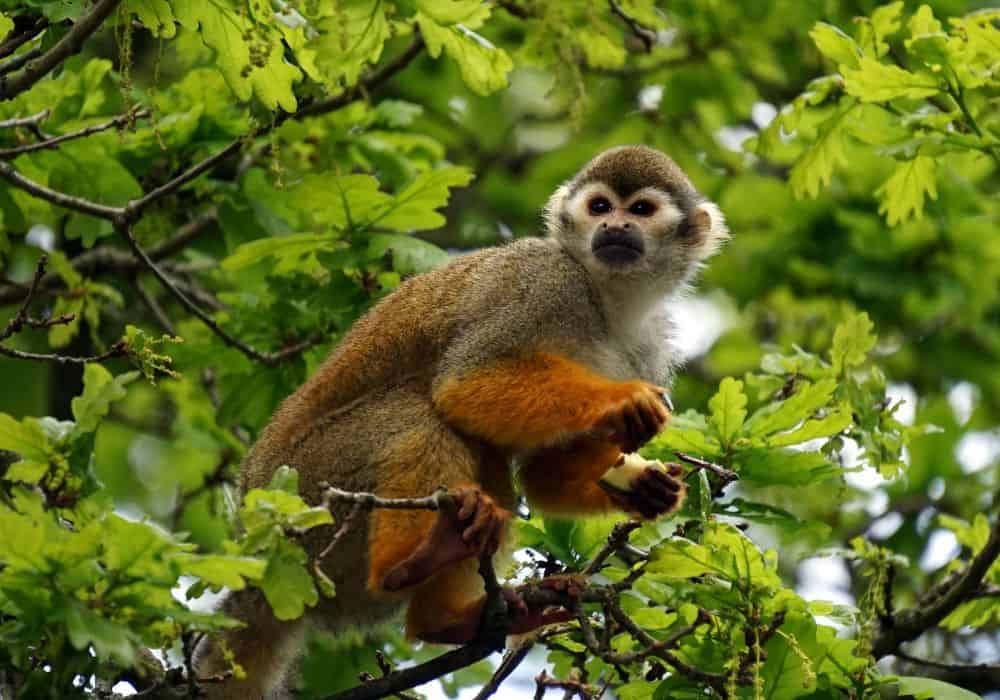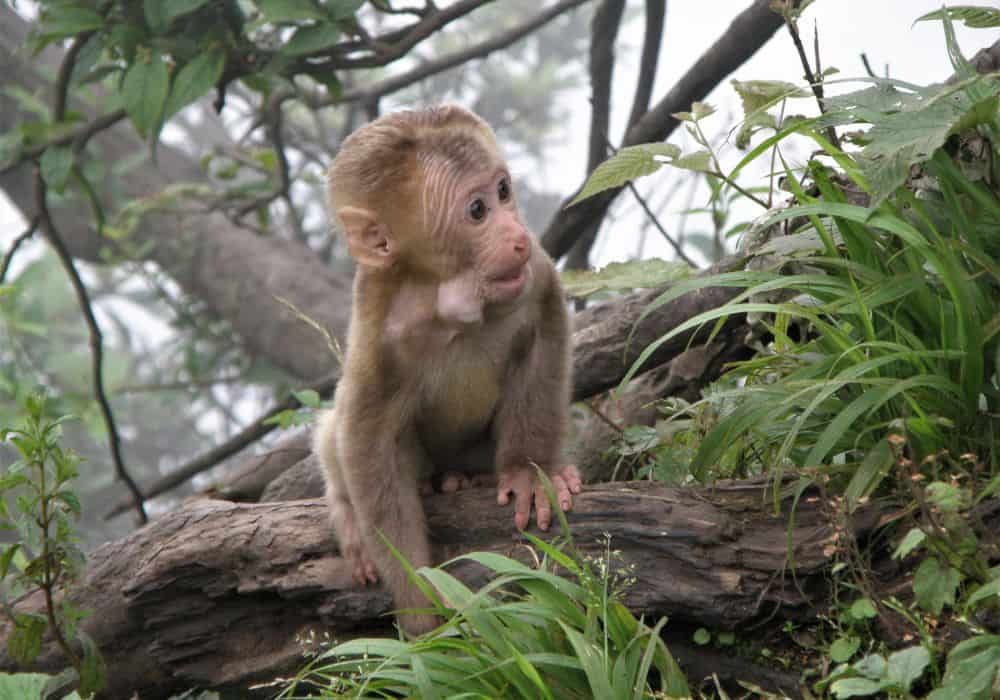As one of our closest relatives on the planet, monkeys carry many hidden and exciting meanings for people. It seems that we have been fascinated by these amazing primates since ancient times. Therefore, it is unsurprising that monkey symbolism is present in almost every culture and belief.
Maybe that is because we often identify and recognize our features in them. Monkeys represent our connection with nature, far removed from the concrete jungle we live in today. Their intelligence, playfulness, and adaptability are just some of the numerous features that made them our spirit animals!
To learn more about these mind-boggling creatures, keep reading!
Monkey Symbolism and Meaning
Before we dive into the symbolism and meaning, it is important to stress a key distinction between monkeys and apes, which is common knowledge but often gets overlooked.
Monkeys have tails that human beings and gorillas, which are apes, do not possess. Monkeys are generally built for running on four legs, while their tails have a vital function – to assist them in climbing or as an extra hand.
Now that we have clarified that, let’s discuss monkeys and their numerous symbolical connotations.
Although their most prominent symbolic meaning relates to energy and playful nature, they are also associated with mischief, courage, and trickery.
If you ever came across a video of monkeys at the zoo or in nature, you must have noticed that they are very inquisitive and will not shy away from taking your phone or anything interesting to them.
Humans feel a strong bond with monkeys for a reason – we share similar social traits as monkeys have a strong capacity for compassion, bonding, and understanding.
Furthermore, they are very sociable. And just like us, monkeys live in hierarchical and dynamical tight-knit groups/clans, and as such, they represent communication, cooperation, and socialization.
Monkey Totem Animal
If a monkey is your totem animal, that is a strong indicator that you have a penchant for practical jokes, skits, and kind-hearted trickery. These things will make you a valuable amulet for a comedian and other playful souls that use laughter to relieve stress and bring joy to other people.
Although jokes are usually seen as positive reinforcement, it is crucial for people with monkey totem animals to learn how to restrict their playfulness without hurting other people’s feelings.
Furthermore, people with totems are believed to be emotionally expressive, and most live in the moment. On the other hand, monkeys are very bold and rarely back down from a challenge which explains why a monkey totem can be a powerful source of courage.
These totems teach people to stay positive, motivated, and happy while navigating life’s hardships. The famous Latin proverb says, “Carpe Diem” or “Seize the Day”, and this is a true embodiment of a person with a monkey totem – living life to the fullest and using every opportunity it offers.
Monkey Spirit Animal
People with a monkey as their spirit animal naturally lean toward fun, playfulness, and motivation. Just like monkeys who like to move around, an individual with a ‘monkey personality’ is full of zeal and enjoys traveling, adventure and thrill.
The monkey spirit animal can serve as a reminder to live every day of your life with optimism and a positive attitude, and that fun is an essential part of our life, just as work.
Given that monkeys are associated with intelligence and wisdom, these are also the characteristics of people with monkey spirit animals. They usually ‘appear’ in situations that call for complex problem-solving.
Monkey in Dreams
Monkeys share a special bond with human beings for numerous reasons, and their appearing in our dreams carries a hatful of meaning which can be interpreted in several ways.
If you ever dreamt of monkeys dancing, that is your sign that fun and happiness are on the horizon. It simply means it’s time to relax, let off some steam, and spend quality time with your friends and family.
Experiencing dreams in which monkeys are chattering, reaching a deafening sound might infer that you are being deceived by someone using flattery and sweet words. They likely have a hidden and ulterior motive, so it is best to stay away from them.
If a monkey bites you in your dream, there is a possibility you said or done something to someone that is coming back to bite you. In this situation, be ready to un-ruffle some feathers and deal with the negative energy surrounding you.
Some people dream of monkeys roaming through the jungle, which usually indicates an issue that calls for creative problem-solving. When faced with an artistic block, pushing through and finding the correct answer and motivation is hard.
However, the monkey in the dream is reassuring you and telling you to trust your gut and follow through. If a monkey is chasing you in a dream, you must be careful of strangers and new faces in your friend circle.
These dreams usually indicate that you should rely on intuition and instinct when making fast decisions.
Generally, seeing monkeys in your dream is a good sign, and their presence usually warns you about a threat in your surrounding or within yourself and encourages you to deal with it.
On the other hand, when deciphering the meaning of a dream with a monkey, it is vital to pay attention to context as it carries a key role. For example, if your dream of monkeys differs from the typical characteristics associated with their nature, it might indicate something negative.
Monkey Encounter and Omen
Encountering a monkey is usually a sign of trouble coming your way, but it can be interpreted as protection and guardianship. Either way, the encounter warns you and prepares you for what is coming, so you can deal with it.
One of the most prominent qualities of monkeys is their intelligence, so monkey encounters might be a reminder to use one’s ‘brains’ in dealing with impending troubles. It can also serve as a reminder to contain your selfishness and overindulgence.
Often these encounters stress the importance of exercising self-restraint and prudence, some of the essential values that set us apart from other creatures. Most notions associated with monkey encounters are positive, and they are a powerful sign of good luck.
However, you should note that determining the meaning of your encounter with a monkey depends on your religion and specific culture, as both negative and positive connotations can be attributed to the encounter.
Monkey in Mythology and Folklore
Since the dawn of ages, monkeys have been part of our lives, which is why they are present in numerous cultures and mythologies.
Native American Culture
Monkeys have an important place in Central and South American mythology in Native American culture and religion centered around nature and natural phenomena.
They are often portrayed as cunning, wise, playful, and tricksters, but not all cultures depict them in a positive light – in some cultures, they are believed to be greedy and lazy.
The folklore involving monkeys in the Americas is associated with monkey clans; for example, the Chibcha tribes of Central America were fascinated by spider monkey clans, while the Yagua and Guajiro tribes of South America based some of their mythology on howler monkey clans.
The Mayans of Guatemala and Mexico believed in and worshiped a howler monkey god (often shown as twin gods) who was the protector of the arts-music and scribes. In the Mayan Calendar, the Howler Monkey symbolizes knowledge of history, rituals, and prophecy. The legendary site “Ciudad Blanca” in Honduras was dedicated to Monkey God, although its location was never discovered.
In the Aztec mythology of Mexico, monkeys were linked to the sun, and their protector was Cochipili, the god of flowers, fun, and fertility. There are several folklore tales involving monkeys, such as Fox and
Monkey, which tells a story of a monkey tricking a fox; The Lost Timber Spirits, a tale of a monkey who was improperly buried and became a ghost.
Native American culture is filled with animal gods. In general, animals have numerous meanings and interpretations vital for their life, so it does not surprise that their tribes worshiped monkey gods such as Iwarrika.
This god is mentioned in the myth of the Acawai Flood, which says that Iwarrika’s curiosity led him to disturb a damn, destroying it and causing a world flood.
Interestingly, in the Athabascan lore, there are writings of Tcetin or Monkey People, believed to be some humanoid creatures who came from ‘across the ocean’ and lived in the trees and caves.
Chinese Culture
Monkeys are also present in Chinese culture and folklore, appearing in the Chinese Zodiacal beliefs. According to Chinese astrology, people born under the Zodiac sign Monkey are knowledgeable and playful.
As a matter of fact, people in China strive to give birth during the Year of Monkey as they believe that the baby will be clever. Therefore, the Chinese tend to say, “your kid is like a monkey,” a common saying considered a compliment and praise.
In some areas of China, people believe that monkeys are protectors of babies, and they ward off evil spirits from their offspring. In ancient Chinese folklore and religion, monkeys were regarded as supernatural creatures who could speak, know the past, and behave like human beings.
Stories of female and male demon monkeys also permeated their culture, and legends of monkey-human interbreeding are common. They could be found in Soushen Ji, the collection of Chinese stories, myths, and tales.
The most well-known monkey god in Chinese folklore is Sun Wukong, also known as Monkey King, the legendary mythical creature. Dating to the 16th century, the novel “Journey to the West” tells the story of the Monkey God who acquires supernatural powers using Taoist practices and later rebels against heaven and is imprisoned under a mountain.
Many scholars believe that Ramayana, the ancient Indian epic, influenced Chinese interpretations of monkeys and their presence in folklore.
Japanese Culture
Japanese culture and mythology feature numerous tales about monkeys whose role and meaning changed over time. For example, from the 8th century, monkeys were believed to be mediators between god and humans.
In several historical records originating in Japan, monkeys are shown as horse guardians or “umayagami,” and the people attributed healing powers to monkeys.
Acting on this belief, the Japanese would keep monkeys in horse stables, thinking it would protect the horses from any disease. But, interestingly, the view of monkeys and their representation changed in the 13th century, when people began associating them with pranksters and dislikeable people.
Later, the role shifted and began representing an opposing side of human beings’ nature- foolish imitation of others. In the Japanese culture, the precisely Shinto tradition, there are tales about a god resembling a monkey’ Sarutahiko Okami‘, who guards the crossroad between earth and heaven.
In the tale “Saru Kani Gassan,” the monkey-god is an evil trickster who deceives a crab into giving him a rice ball in exchange for some seeds. Different folklore “Momotaro” tells a story of a hero, Momotaro, who befriends a monkey, a dog, and a peasant.
You must have come across a popular proverb: ‘See no evil, hear no evil, speak no evil.’ If you have not heard of it, you probably saw a photo of three wise monkeys: Mizaru, who’s blind to evil and is covering his eyes; Kikazaru, who is deaf to evil and is covering his ears and Iwazaru, who utters no evil and is covering his mouth.
Greek Mythology
Although monkeys are not prominently featured in Greek mythology, there is a myth about the Cercopes, two monkey-like thieves living in the forests of Western Anatolia. The two thieves were proverbial cunning liars and cheats and were once captured by Heracles for stealing their weapons.
However, they won him with their jokes and good-hearted trickery, so he chose to set them free. Later, Zeus turned them into monkeys as a punishment for their crimes.
Christianity
Talking of Christianity, there is no explicit mention of monkeys in the bible. However, apes are referenced twice. Generally, the instances involving monkeys or apes are primarily associated in Christianity with the dark side of humanity, malice, greed, and lust.
Conclusion
If you ever find yourself in a situation in which someone calls you a monkey, instead of getting mad, just think of the numerous positive connotations this animal has in various cultures of the world.
So, it does not have to be necessarily an insult since monkeys represent playfulness, intelligence, good-hearted trickery, laughter, and the list goes on. If you agree or disagree with us, leave a comment and share your thoughts!
